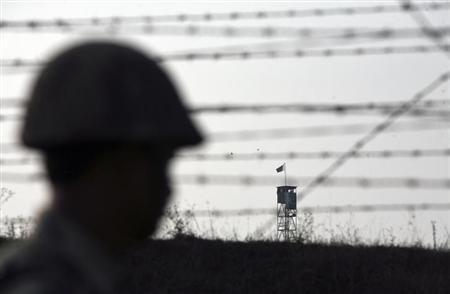
In yet another ceasefire violation along the border in Jammu, a soldier was killed on Wednesday. Despite efforts from Indian government to settle disputes, there have been constant cross-firings at the Line of Control raising dilemma over a permanent end to it.
The four Border Security Force (BSF) soldiers retaliated to the firing by Pakistani Rangers along international border in Arina at RS Pura in Jammu at around 11:40 am, according to Times of India.
All four BSF soldiers, injured during the firing were taken to Government Medical College Hospital, where one of the soldiers died.
There were hopes that the Indo-Pak ties would improvise with the accession of Narendra Modi as the Prime Minister of India, consequently, settling confrontation disputes at LoC in Kashmir.
However, the history of Indo-Pak relation regarding ceasefire violations contradicts the hopes of friendly ties. The past instances show that the end to tug of war over J&K between the two nations is uncertain.
Like Modi, former Prime Ministers—Lal Bahadur Shastri, Indira Gandhi, Atal Bihari Vajpayee too tried to settle the dispute over Kashmir for once and all. However, each one of them failed at their efforts.
The war over accession of Kashmir started right after the partition of India and Pakistan in 1947, however, United Nations interfered and ended the war in 1949 by establishing ceasefire.
Even the UN directions failed to end disputes over disrupted part of Kashmir—Azad Kashmir, Pakistani Occupied Kashmir. Hence, giving birth to a second war in 1965. A large troop of Pakistani soldiers disguised as Kashmiris reportedly entered into Indian side of the Kashmir and a war broke out. It lasted for five months, ending in September with the UN's mandated ceasefire.
- Third Indian Prime Minsiter & former leader of Congress party Lal Bahadur Shashtri trying to re-establish diplomatic relations between the nations signed a peace agreement— Tashkent Declaration—with Pakistani President Muhammad Ayub Khan. They agreed to settle back to the borderlines prior to the war.
- However, a war between the two nations broke out in 1971, over East Pakistan—presently Bangladesh, following which Prime Minister Indira Gandhi signed the Simla Agreement with Pakistani Prime Minister Zulifiqar Ali Bhutto.
Signing the agreement both sides reportedly agreed to end the conflict and confrontation at LoC by peaceful means.
- The tensions along the LoC reached a new height with the intrusion of armed militants—allegedly trained in Pakistan—in India. Reviving the Simla Agreement, the then Prime Ministers of India and Pakistan, Atal Bihari Vajpayee and Nawaz Sharif respectively, signed Lahore Agreement in 1999. Despite the agreement, a major war broke out between the two neighbours, known as Kargil war, leading to worsened situation in Kashmir.
- Vajpayee's second effort to sort out Indo-Pak differences collapsed in 2001, when the two countries failed to reach a consensus on the Kashmir issue. Pakistani President General Pervez Musharraf even declared that they have a right to Kashmir. However, in 2003, they reached a consensus on easing tensions at LoC.
- The situation reportedly improved by the time Indian National Congress overtook NDA government and Manmohan Singh became the Prime Minister of India. However, terror attacks in Mumbai and Samjhauta Express further worsened the diplomatic relation.
The ceasefire violation again took off in 2010, with India and Pakistan soldiers exchanging fire at LoC. Along with strings of cross fire at the border, began the blame game between the two nations. Both nations blamed each other for violating the ceasefire in Kashmir.
- The issue was addressed by Singh and Sharif in the UN general assembly in 2013. Both the countries agreed upon settling the issue to end confrontations in the disputed Kashmir. However, there were reportedly around 168 ceasefire violations from 2013 until May 2014.
- Soon after becoming Indian PM, Narendra Modi took a friendly initiative and invited Sharif (along with other SAARC nations) to his swearing-in ceremony. They held talks on 27 May and shared their willingness to settle disputes between the two nations. However, the ceasefire violations remain to continue with latest attack on 16 July.
As the history suggests, despite several efforts by the Indian government to end the LoC confrontation, Pakistan has been violating ceasefire constantly. Modi, like his predecessors, is apparently trying to put the Kashmir issue to peace.
Sharif, who is the current PM of Pakistan, was in the power in 1999 as well, when the armed conflict broke out in Kargil—one of the major wars of all times in the valley of Kashmir. There linger chances that military forces might again break in on Indian side, against the will of their government.
Apart from the incessant confrontation at the LoC Pakistan has been alleged to have provided shelter and help to many militant groups, which again is a matter of contention between India and Pakistan.

















